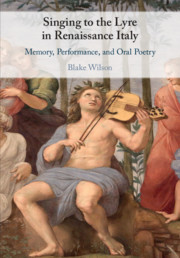
- Cited by 2
-
Cited byCrossref Citations
This Book has been cited by the following publications. This list is generated based on data provided by Crossref.
Viccei, Raffaella 2020. Raffaello e Omero (da Urbino alla Stanza della Segnatura). Antike und Abendland, Vol. 65-66, Issue. 1, p. 208.
Pieragostini, Renata 2021. The Healing Power of Music? Documentary Evidence from Late-Fourteenth-Century Bologna. Speculum, Vol. 96, Issue. 1, p. 156.
- Publisher:
- Cambridge University Press
- Online publication date:
- October 2019
- Print publication year:
- 2019
- Online ISBN:
- 9781108768887




